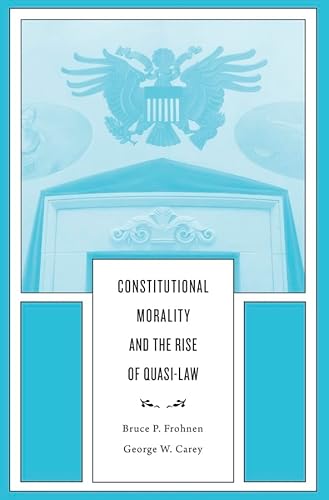Constitutional Morality and the Rise of Quasi-Law
Bruce P. Frohnen; George W. Carey
BOOK REVIEW

In Constitutional Morality and the Rise of Quasi-Law, Bruce P. Frohnen and George W. Carey delve into the intricate and often tumultuous relationship between constitutional principles and the burgeoning influence of quasi-law in America. As the authors take us on an intellectual journey, they invite you to confront uncomfortable truths about the erosion of traditional legal frameworks and the implications of subjective morality reshaping our society.
At the heart of this compelling work lies a stark warning: the very fabric of our legal system is under siege. With a masterful blend of historical analysis and philosophical inquiry, Frohnen and Carey dissect the metamorphosis of our legal landscape, one which seems increasingly governed by fleeting opinions rather than steadfast constitutional principles. The authors propose that, as we drift away from the fundamentals of constitutional morality, we risk forfeiting the very ideals that serve as the backbone of our democratic institutions.
This book doesn't merely recount history-it ignites a fire within you to reconsider what you might have taken for granted. Have you ever pondered why laws seem more about political maneuvering than about justice? The authors' incisive critique reveals how legislative bodies often succumb to the whims of societal pressures, crafting laws that reflect the ephemeral rather than the timeless. As they dissect case studies and landmark decisions, Frohnen and Carey illustrate the unsettling shift toward a quasi-law environment where legal decisions become not just reflections of the rule of law, but rather tools wielded by those in power to shape outcomes.
The emotional weight of this discourse may leave you reeling. The authors compel you to acknowledge that the consequences of ignoring constitutional morality extend far beyond legal scholars and practitioners-they impact the very citizens who depend on a fair and unbiased justice system. You might find yourself grappling with the haunting realization that our moral compass has been recalibrated, rendering the rule of law susceptible to the tides of public opinion and moral relativism.
Readers have responded with a mix of admiration and controversy, applauding Frohnen and Carey for their fearless exploration yet questioning if their conclusions are alarmist. Those who embrace the authors' argument argue that the degradation of constitutional morality poses existential threats to liberty and justice. Conversely, critics suggest the book sometimes leans too heavily toward a nostalgic view of American law, underestimating the complexity of modern societal challenges. Yet, in a world where the very notion of truth is under siege, the importance of this conversation cannot be overstated.
You may feel an unsettling sense of urgency as you navigate through the text, as if the authors are saying, "This is your moment to choose: will you be a passive observer or an active participant in the preservation of your rights?" Frohnen and Carey underscore how historical events, from the civil rights movement to contemporary debates over individual rights, have been influenced by the tension between constitutional fidelity and the allure of convenience in the creation of law. The stakes are personal, urging you to reflect deeply on how these shifts impact your own life and community.
As you plunge deeper into the authors' meticulous arguments, an electric feeling courses through you, a desire to engage with these ideas in fierce discussions or long-overdue personal reflections. This book pushes boundaries, igniting your passion for truth in a dizzying political landscape often characterized by disinformation.
Indeed, you might find that Constitutional Morality and the Rise of Quasi-Law isn't merely an academic treatise; it's a rallying cry for those who believe in the sanctity of the rule of law. The authors compel you to stand against complacency and advocate for a return to principled legality, one that informs not just policy but the very ethos of American identity.
In a world flooded with noise and pretense, Frohnen and Carey's work lingers in your mind long after you've turned the last page. They don't just deliver a message; they plant seeds of awareness, compelling you to evaluate the moral and legal undertones surrounding the very framework that governs our lives. Overwhelmingly, this book serves as both a warning and a guide-a poignant reminder that while history may be written by the victors, it is the moral foundations we uphold that dictate the course of our future. 🌌 Are you ready to engage with these thoughts and rediscover the essence of constitutional morality? The choice is yours.
📖 Constitutional Morality and the Rise of Quasi-Law
✍ by Bruce P. Frohnen; George W. Carey
🧾 304 pages
2016
#constitutional #morality #rise #quasi #bruce #frohnen #BrucePFrohnen #george #carey #GeorgeWCarey